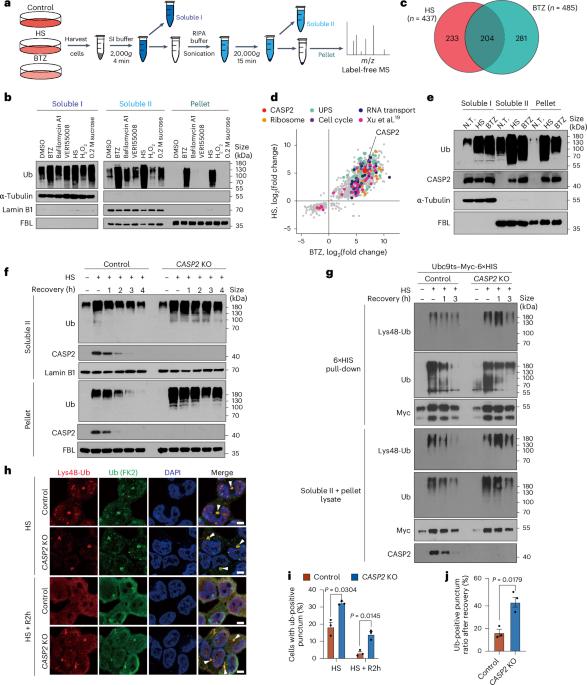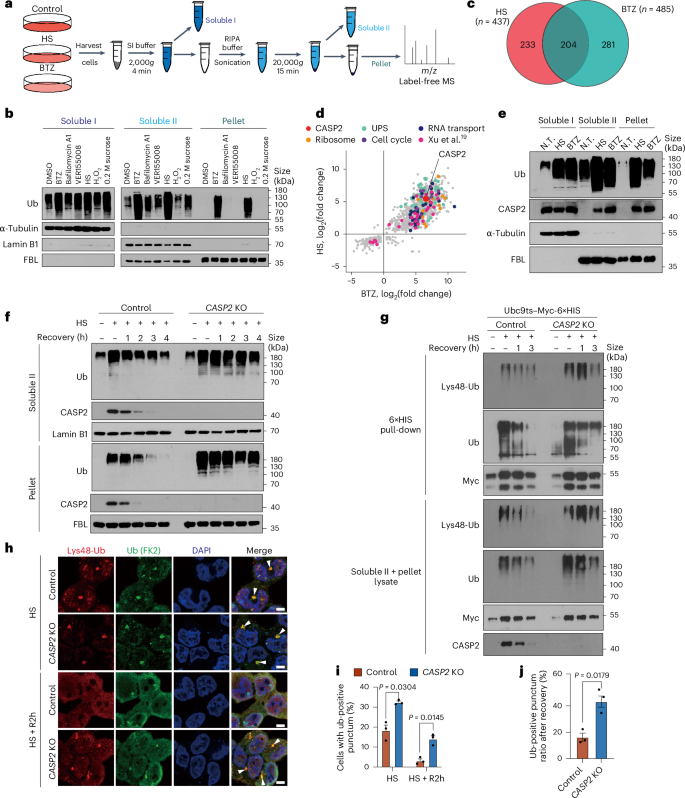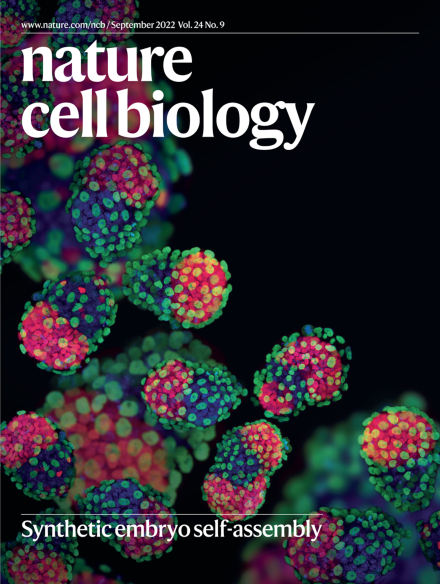Caspase-2 is a condensate-mediated deubiquitinase in protein quality control
IF 17.3
1区 生物学
Q1 CELL BIOLOGY
引用次数: 0
Abstract
Protein ubiquitination plays a critical role in protein quality control in response to cellular stress. The excessive accumulation of ubiquitinated conjugates can be detrimental to cells and is recognized as a hallmark of multiple neurodegenerative diseases. However, an in-depth understanding of how the excessive ubiquitin chains are removed to maintain ubiquitin homeostasis post stress remains largely unclear. Here we found that caspase-2 (CASP2) accumulates in a ubiquitin and proteasome-positive biomolecular condensate, which we named ubstressome, following stress and functions as a deubiquitinase to remove overloaded ubiquitin chains on proteins prone to misfolding. Mechanistically, CASP2 binds to the poly-ubiquitinated conjugates through its allosteric ubiquitin-interacting motif-like region and decreases overloaded ubiquitin chains in a protease-dependent manner to promote substrate degradation. CASP2 deficiency in mice results in excessive accumulation of poly-ubiquitinated TAR DNA-binding protein 43, leading to motor defects. Our findings uncover a stress-evoked deubiquitinating activity of CASP2 in the maintenance of cellular ubiquitin homeostasis, which differs from the well-known roles of caspase in apoptosis and inflammation. These data also reveal unrecognized protein quality control functions of condensates in the removal of stress-induced ubiquitin chains. Ge, Zhou, Fu et al. find caspase-2 accumulates in biomolecular condensates with ubiquitin and proteasomal components and functions as a deubiquitinase following stress. Caspase-2-deficient mice accumulate poly-ubiquitinated TDP-43 and show motor defects.


Caspase-2是蛋白质质量控制中由凝结物介导的去泛素酶
蛋白质泛素化在应对细胞压力的蛋白质质量控制中发挥着关键作用。泛素化共轭物的过度积累会对细胞造成危害,被认为是多种神经退行性疾病的标志。然而,深入了解应激后如何清除过量泛素链以维持泛素平衡在很大程度上仍不清楚。在这里,我们发现在应激后,caspase-2(CASP2)会在泛素和蛋白酶体阳性的生物分子凝聚物(我们将其命名为ubstressome)中聚集,并发挥去泛素酶的功能,清除易发生错误折叠的蛋白质上过量的泛素链。从机理上讲,CASP2通过其异位泛素相互作用基序样区域与多泛素化共轭物结合,并以蛋白酶依赖的方式减少过载的泛素链,从而促进底物降解。小鼠缺乏 CASP2 会导致多泛素化的 TAR DNA 结合蛋白 43 过度积累,从而导致运动缺陷。我们的发现揭示了 CASP2 在维持细胞泛素平衡中的应激诱发的去泛素活性,这与众所周知的 caspase 在细胞凋亡和炎症中的作用不同。这些数据还揭示了冷凝物在清除应激诱导的泛素链过程中尚未被认识到的蛋白质质量控制功能。
本文章由计算机程序翻译,如有差异,请以英文原文为准。
求助全文
约1分钟内获得全文
求助全文
来源期刊

Nature Cell Biology
生物-细胞生物学
CiteScore
28.40
自引率
0.90%
发文量
219
审稿时长
3 months
期刊介绍:
Nature Cell Biology, a prestigious journal, upholds a commitment to publishing papers of the highest quality across all areas of cell biology, with a particular focus on elucidating mechanisms underlying fundamental cell biological processes. The journal's broad scope encompasses various areas of interest, including but not limited to:
-Autophagy
-Cancer biology
-Cell adhesion and migration
-Cell cycle and growth
-Cell death
-Chromatin and epigenetics
-Cytoskeletal dynamics
-Developmental biology
-DNA replication and repair
-Mechanisms of human disease
-Mechanobiology
-Membrane traffic and dynamics
-Metabolism
-Nuclear organization and dynamics
-Organelle biology
-Proteolysis and quality control
-RNA biology
-Signal transduction
-Stem cell biology
 求助内容:
求助内容: 应助结果提醒方式:
应助结果提醒方式:


